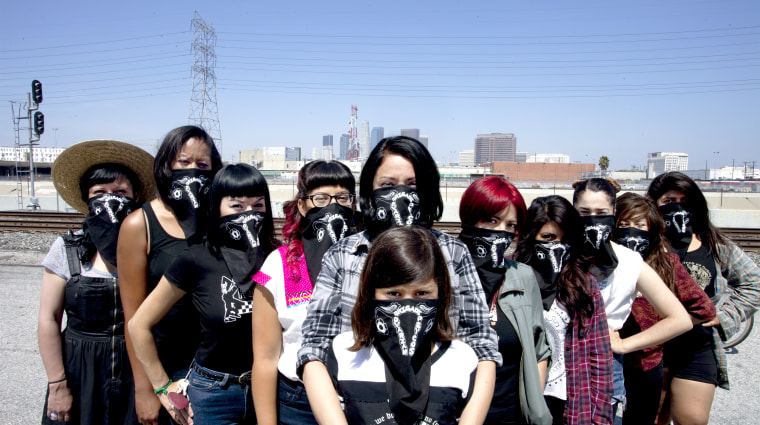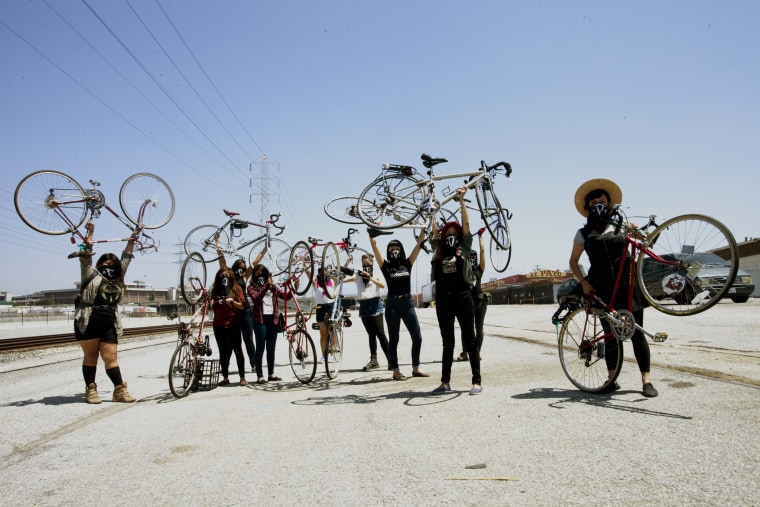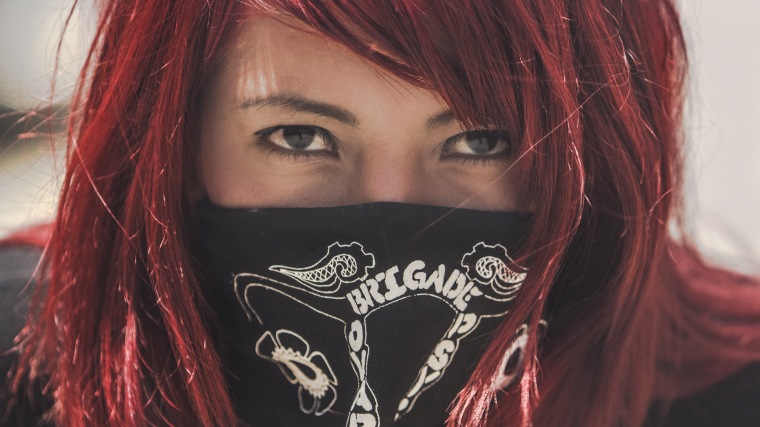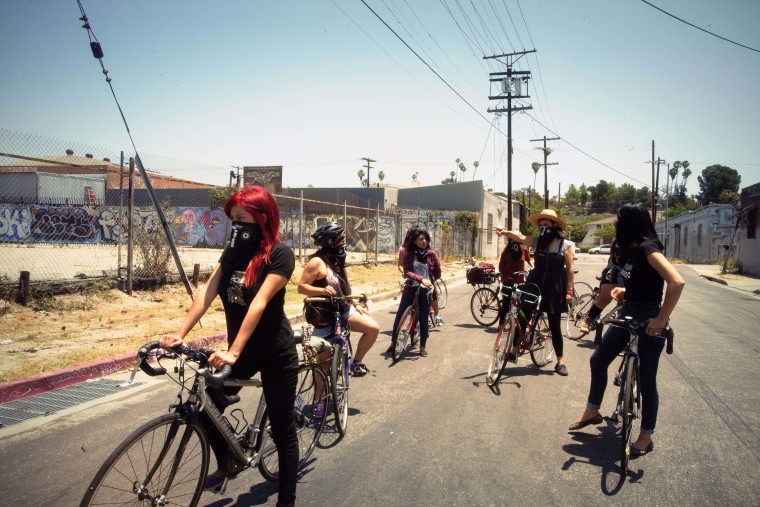
They are cycling through the dark streets of downtown Los Angeles en masse, pumping their fists and shouting “Whose street? Our street!” They are fighting domestic violence and gentrification in their communities and in their own lives. They are by turns aggressive and vulnerable, political and irreverent.
These are the young Latinas who call themselves the Ovarian Psycos, (yes, no "h" in the word "psyco") an all-female bike brigade and the subject of a documentary airing on PBS Independent Lens. The film, which debuted at South by Southwest last year, now has its broadcast premiere on Monday, March 27.
The Ovarian Psycos are no mere recreational riding crew. Their website describes the group as believing in “feminist ideals with indígena (indigenous) understanding and an urban/hood mentality.”

In more everyday language, as one founding member of the group puts it in the film, “It’s (the Ovarian Psycos) for the uneducated woman, it’s for the knuckle-headed girls, the punk rockers, the cholas, the sisters in the neighborhood that lived that hard life.”
Founded in 2010 in East Los Angeles, the Ovarian Psycos say that their group bike rides are a form of empowerment. Their bicycles, members observe in the film, represent not only a way to exercise their bodies but also an opportunity to organize in their communities.
The group holds monthly rides around Los Angeles, often with a political theme. Calling themselves the “Ovas,” they recruit new members with flyers bearing the provocative tagline, “Sixter, are you psyco?”
Joanna Sokolowski, director/producer of the film, told NBC Latino that she and her filmmaking partner Kate Trumbull-LaValle approached the Ovarian Psycos because “we were looking for stories about young radical women.”
“They are fighting to reclaim their voices,” Sokolowski said. “For me, they really embody what I see as the future of feminist activism.” The Ovarian Psycos, she noted, are queer- and trans-inclusive and hold co-ed as well as all-female rides.
The Ovarian Psycos proudly sport what some might view as symbols of an outlaw movement, from their bandanas to at times-defiant language. But Sokowlski sees this as a strategic move. “The Ovarian Psycos are very cognizant of how they use imagery and symbolism. It is an act of protest to them, and we tried to show that and connect it with the legacy of where they live.”
Los Angeles is renowned for its freeway/car culture, and cycling is known both as a sport dominated by men and rife with sexism. So the Ovarian Psycos’ existence can be seen as a collective form of rebellion against societal norms.
Maylei Blackwell, associate professor at the University of California Los Angeles and author of Chicana Power, told NBC Latino that the Ovarian Psycos fit into a long legacy of women of color organizing.
“What they are doing amounts to a kind of feminism that is organic to their communities and reflects a younger perspective,” said Blackwell. “What many women are shamed by, or what they are often the victims of violence over, they are claiming as their own and putting it upfront.”
East Los Angeles has traditionally been a hotbed of Latinx activism, Blackwell explained. “Now, the Psycos organizing is related to women’s mobility issues, fears of displacement, and sexual harassment issues.”
The neighborhood where many of the Psycos live, Boyle Heights, has one of the highest population densities in the city of Los Angeles and in Los Angeles County. East Los Angeles, where Boyle Heights is situated, is approximately 97 percent Latino.
The film chronicles how this environment can lead to stress and trauma among young Latinas.

Several of the “Ovas” – strong and seemingly invincible in public – deal with anxiety and insecurities at home. One of the member’s mothers wonders why her college-age daughter is even riding a bike, which the older woman terms “more of a boy thing than a girl thing.” Another member, a single parent, strives to raise her daughter free of racism, sexism, and gender stereotypes.
Xela de la X, a founding member of the Ovarian Psycos, explains in the film that the bike brigade is the rare way for lower- and working-class young women to connect. Sisterhood, community organizing, and social justice are their ongoing, larger goals – which the Psycos take very seriously. “We have a responsibility to make our lives, our pain, and our rage meaningful” De la X says.
Kate Trumbull-LaValle told NBC Latino that the Ovarian Psycos as drawing upon everything from the Zapatista movement to the Chicana movement to biking culture. “This is not just a story of women on bikes,” she said. “This is about how complex the lives of working class activists are, as mothers, daughters, sisters, and citizens.”

“When I look at the Psycos, I see strength, intelligence, and a re-appropriating strategy,” Trumbull-LaValle stated. “Some folks, yes, they might see a stereotype because they are reclaiming language that is circulating on the Eastside. But we tried to show that they are in control of their work, their lives, and their messaging.”
Ovarian Psycos ends with a grim statistic form the World Health Organization, that one in three women experience physical or sexual violence, and most likely from an intimate partner.
“What we’ve tried to do, and what I hope people see is the work the Psycos are doing on their own terms,” said Trumbull-LaValle.
“The heart of the film is really organizing,” she added. “I hope their work is inspiring to people across different communities; they show us the importance of sisterhood and neighborhoods, and that is an important lesson for us all.”
